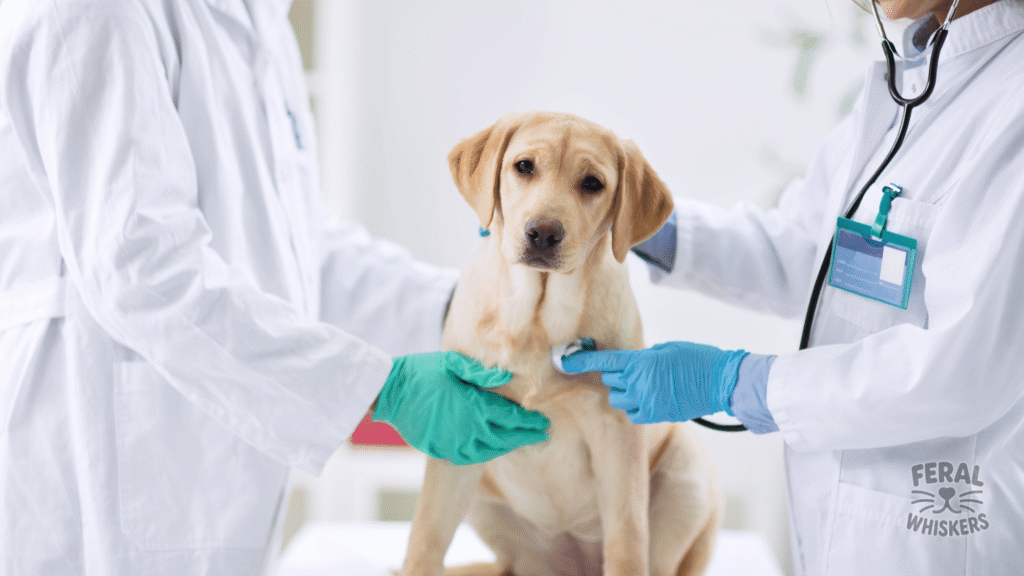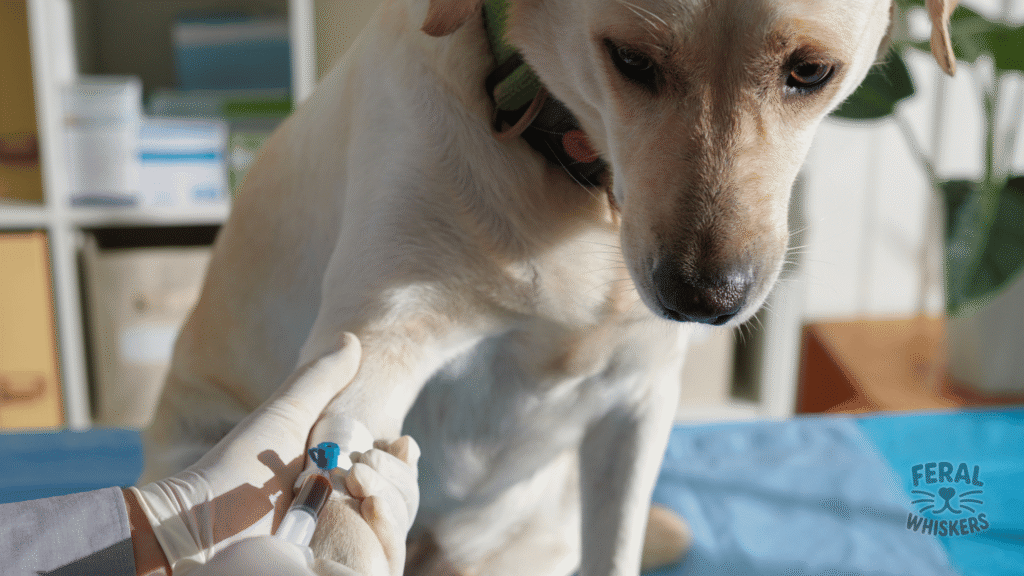Introduction: What Every Fur Parent Needs to Know About Heartworm

Heartworm disease is one of the most serious and scary parasites your dog can face. Unlike fleas and ticks that live on the outside, heartworms live inside your dog’s heart and lungs. They’re spread by mosquitoes, and if left untreated, they can cause severe damage and even be fatal.
The good news? Heartworm is almost 100% preventable!
This guide will break down everything you need to know in a simple, easy-to-understand way:
- What heartworm is and how dogs get it.
- The serious symptoms to watch out for.
- How vets diagnose and treat this dangerous disease.
- The best prevention methods (both vet-recommended and budget-friendly natural supports).
- Holistic care to support your dog’s overall health.
Let’s make sure your pup’s heart stays healthy and strong!
1. What is Heartworm Disease and How Do Dogs Get It?
Imagine tiny spaghetti-like worms living in your dog’s heart and the blood vessels leading to their lungs. That’s heartworm.
1.1 The Mosquito Connection
Dogs don’t get heartworm directly from other dogs. They get it from mosquitoes.
- A mosquito bites an infected dog and picks up baby heartworms (called microfilariae).
- These baby worms grow inside the mosquito for 10-14 days.
- The same mosquito then bites your dog, injecting the now-infective baby worms into their bloodstream.
- Over the next 6-7 months, these worms travel through your dog’s body and settle in the heart and lung arteries, growing into adult worms (which can be up to 30 cm long!).
1.2 Why It’s So Serious
Adult heartworms cause damage by:
- Blocking blood flow: Making it hard for the heart to pump blood.
- Damaging blood vessels: Leading to inflammation and scarring in the lungs.
- Straining the heart: Eventually leading to heart failure.
Even a few worms can cause serious problems, and the damage can be permanent.
2. Spotting the Signs: Is Your Dog Showing Heartworm Symptoms?
Heartworm disease is sneaky because dogs often show no symptoms at all in the early stages. It can take months or even years for signs to appear, by which time the disease is often advanced.
2.1 Early Stage (Mild Disease)
- Occasional cough: Especially after exercise.
- Slight decrease in activity: They might get tired a bit faster.
2.2 Moderate Stage (More Noticeable)
- Persistent cough: More frequent and noticeable.
- Reluctance to exercise: They don’t want to play as much or get tired very quickly.
- Weight loss: Even if they’re eating normally.
- Decreased appetite.
2.3 Severe Stage (Advanced Disease)
- Chronic cough: A deep, persistent cough.
- Difficulty breathing: Shortness of breath, especially after activity.
- Heart failure signs: Swollen belly (due to fluid buildup), pale gums, fainting.
- “Caval Syndrome” (Emergency!): This is a sudden, life-threatening blockage of blood flow in the heart by a large mass of worms. Signs include sudden weakness, dark urine, pale gums, and difficulty breathing. This requires immediate emergency vet care.
Because symptoms appear so late, regular testing is crucial, even if your dog seems healthy.
3. How Your Vet Diagnoses Heartworm

Your vet can easily check for heartworm with a simple blood test.
3.1 The Annual Blood Test
- Antigen Test: This is the most common test. It checks for proteins released by adult female heartworms. It’s very accurate for detecting established infections.
- Microfilariae Test: This test looks for the baby heartworms (microfilariae) in your dog’s blood. If these are present, it means your dog has adult heartworms that are reproducing.
- Why both? Sometimes a dog has adult worms but no microfilariae (e.g., if they’re on certain preventives). Doing both gives a complete picture.
- When to test: Most vets recommend annual heartworm testing for all dogs, even those on year-round prevention. This is because no preventive is 100% perfect, and missing a dose can happen.
3.2 Further Tests for Positive Dogs
If your dog tests positive, your vet will likely do more tests to see how severe the disease is:
- Chest X-rays: To check for damage to the heart and lungs.
- Blood work: To assess overall health and organ function.
- Echocardiogram (ultrasound of the heart): To see the worms directly and assess heart damage.
4. Vet-Recommended Treatment for Heartworm
Treating heartworm disease is a serious, complex, and often expensive process. It involves killing the adult worms, which can be risky.
4.1 The Treatment Process
- Stabilization (if needed): For dogs with severe disease, the vet might need to stabilize their heart and lung function before starting treatment.
- Pre-treatment medications: Your dog will likely receive antibiotics (doxycycline) for a month to kill a bacteria (Wolbachia) that lives inside heartworms, making the adult worms weaker and reducing complications. They might also get steroids to reduce inflammation.
- Adulticide Injections: This is the main treatment. Your dog will receive a series of injections (usually 2-3 injections over 1-2 months) of a drug called melarsomine (an arsenic-based drug) into their back muscles. This drug kills the adult heartworms.
- Strict Rest: This is CRITICAL. For 6-8 weeks after the injections, your dog must have strict cage rest or very limited activity. This is because as the worms die, they break up and can travel to the lungs, causing blockages (embolisms). Exercise increases blood flow and the risk of these blockages, which can be fatal.
- Post-treatment testing: After treatment, your dog will be re-tested to ensure all the worms are gone.
4.2 Risks and Costs
- Risks: The treatment itself carries risks, including severe inflammation, blood clots, and even death, especially if the dog isn’t kept strictly rested.
- Cost: Heartworm treatment can range from $1,000 to $5,000 or more, depending on the dog’s size, severity of disease, and location. This is why prevention is so much better!
5. Prevention: The Best Way to Protect Your Dog
Preventing heartworm is easy, safe, and much cheaper than treating it.
5.1 Vet-Recommended Prevention (The Gold Standard)
- Monthly or every 6-12 weeks: Heartworm preventives come in chewable tablets, topical spot-ons, or even injections given by your vet every 6 or 12 months.
- Year-round use: Mosquitoes can be active even in cooler months or indoors, so year-round prevention is recommended for all dogs.
- Prescription only: Heartworm preventives are prescription medications because your dog must be tested negative before starting them. Giving preventives to a heartworm-positive dog can cause a severe reaction.
- Combined products: Many preventives also protect against intestinal worms, and some even include flea and tick control (e.g., Simparica Trio, NexGard Spectra).
5.2 Environmental Mosquito Control
Since mosquitoes are the carriers, reducing them helps:
- Eliminate standing water: Empty bird baths, old tires, clogged gutters, and anything that collects water where mosquitoes can breed.
- Use screens: Keep windows and doors screened to prevent mosquitoes from entering your home.
- Avoid peak mosquito times: If possible, walk your dog during times when mosquitoes are less active (mid-day, rather than dawn or dusk).
6. Holistic & Budget-Friendly Care: Supporting Your Dog (When Vet Bills Are Tough)
Important Disclaimer: These holistic and budget-friendly methods are NOT a substitute for vet-prescribed heartworm prevention or treatment. Heartworm is a life-threatening disease. If you cannot afford vet care, please look into local humane societies, vet schools, or financial aid programs that might offer assistance. These natural methods are best used as support alongside conventional prevention, or as a last resort for owners who truly have no other options for prevention.
6.1 Boosting Overall Health & Immunity
A strong, healthy dog is always better equipped to fight off any illness, including parasites.
- Good Nutrition:
- Fresh, whole foods: If possible, feed a diet rich in real meat, vegetables, and healthy fats. Avoid highly processed kibble.
- Antioxidants: Add foods like blueberries, spinach, and carrots to their diet to boost their immune system.
- Omega-3s: Fish oil (sardines, flaxseed oil) helps reduce inflammation and supports overall health.
- Probiotics: A healthy gut means a stronger immune system. Add a spoonful of plain kefir or a canine probiotic supplement to their food daily.
6.2 Natural Mosquito Repellents (Topical)
Since mosquitoes spread heartworm, repelling them is key. These are not 100% effective but can help reduce bites.
- DIY Herbal Spray:
- Recipe: Mix 1 cup distilled water, 1 cup witch hazel, 10 drops lemon eucalyptus oil (safe for dogs, effective mosquito repellent), and 5 drops lavender oil.
- How to use: Spray on your dog’s coat before going outside, especially during mosquito season. Avoid eyes and mouth. Reapply every few hours.
- Neem Oil: Mix a few drops of neem oil with a carrier oil (like coconut oil) and rub it into your dog’s fur. Neem has a strong scent that repels insects.
- Lemon Eucalyptus Oil: This is one of the few essential oils proven to be effective against mosquitoes and is generally considered safe for dogs when properly diluted.
6.3 Environmental Mosquito Reduction (Budget-Friendly)
- Daily Water Patrol: Walk around your yard daily and dump out any standing water – even a bottle cap full can breed mosquitoes. This is free and highly effective!
- Yard Maintenance: Keep grass mowed short and trim bushes. Mosquitoes like to rest in shady, damp areas.
- DIY Mosquito Traps: You can make simple traps with a cut plastic bottle, warm water, sugar, and yeast. (Search online for “DIY mosquito trap” for instructions).
6.4 Herbal Support (Use with Extreme Caution & Vet Guidance if Possible)
Some herbs are traditionally used to support the body against parasites, but their effectiveness against heartworm is not scientifically proven to the same extent as vet medications, and they can be risky. These are NOT a treatment for existing heartworm disease.
- Black Walnut (Green Hull): Some holistic practitioners use this for various parasites. It has strong properties and must be used in very small, specific doses. Never use without professional guidance.
- Wormwood: Another powerful herb used for parasites. Again, extreme caution and professional guidance are essential due to potential toxicity.
- Hawthorn Berry: Used to support heart health. While it won’t kill heartworms, it can help support the heart muscle.
Again, these herbal remedies are not proven to prevent or cure heartworm disease. They are mentioned for informational purposes only and should not be used without consulting a holistic veterinarian.
7. Step-by-Step Plan for Fur Parents (Budget-Conscious)
This plan focuses on prevention and support when vet-prescribed preventives are not an option.
- Annual Testing (Crucial!): Even if you can’t afford prevention, try to get your dog tested for heartworm annually. Knowing if they’re positive is vital. Look for low-cost clinics or humane societies that offer testing.
- Daily Mosquito Patrol: Every day, walk your yard and dump out any standing water.
- Daily Repellent Spray: During mosquito season, spray your dog with a DIY herbal repellent (see 6.2) before every outdoor excursion, especially at dawn and dusk.
- Dietary Support: Add sardines, brewer’s yeast, and/or tiny amounts of garlic to your dog’s food daily (see 6.1).
- Yard Maintenance: Keep your grass mowed and bushes trimmed.
- Indoor Protection: Use screens on windows and doors.
- Monitor Closely: Watch your dog for any signs of coughing, tiredness, or weight loss. If you see these, try to get them to a vet immediately.
- Financial Planning: Start saving a small amount each month for future vet care or heartworm prevention. Look into pet insurance or local assistance programs.
8. Frequently Asked Questions (FAQs)
Q1: Can my dog get heartworm from another dog?
A: No, only from an infected mosquito.
Q2: If my dog is on heartworm prevention, do they still need to be tested?
A: Yes! Annual testing is crucial. No preventive is 100% perfect, and a missed dose can happen. Testing ensures your dog is truly protected.
Q3: Is heartworm prevention safe?
A: Yes, vet-prescribed heartworm preventives are very safe and effective when used correctly. The risks of the disease are far greater than the risks of the medication.
Q4: Can I use essential oils to repel mosquitoes?
A: Some, like lemon eucalyptus oil, are effective and safe for dogs when properly diluted. Always research and dilute carefully, and avoid oils like citronella or tea tree oil, which can be toxic.
Q5: What if I miss a dose of heartworm preventive?
A: Contact your vet immediately. They might recommend a specific protocol or re-testing after a few months.
Q6: Can heartworm be cured naturally?
A: No. There is no scientifically proven natural cure for established heartworm disease. Herbal remedies are not strong enough to kill adult heartworms safely and effectively. Relying on natural methods for treatment can be fatal.
9. Common Worries & Simple Answers
| Your Worry | Simple Answer |
|---|---|
| “My dog never goes outside, so they can’t get heartworm.” | Not true! Mosquitoes can get inside your home. All dogs are at risk. |
| “Heartworm medicine is too expensive.” | Prevention is much, much cheaper than treatment. Look for low-cost clinics or financial aid programs if needed. |
| “I heard heartworm medicine is toxic.” | Vet-prescribed preventives are very safe. The risk of heartworm disease is far greater than the risk of the medication. |
| “My dog is coughing, is it heartworm?” | A cough can be many things. Get your dog tested for heartworm, especially if they’re not on prevention. |
| “I live in a cold climate, so I don’t need prevention.” | Mosquitoes can survive in surprising places, and climate change is extending mosquito seasons. Year-round prevention is safest. |
Conclusion: Protect Your Dog’s Heart!
Heartworm disease is a serious threat, but it doesn’t have to be a worry for your dog. By understanding how it spreads, recognizing the subtle signs, and committing to consistent prevention, you can keep your dog’s heart healthy and strong.
Whether you choose vet-prescribed prevention or rely on diligent budget-friendly methods, your dedication to protecting your furry friend is what truly matters. Talk to your vet, stay informed, and enjoy many happy, healthy years with your beloved companion!

